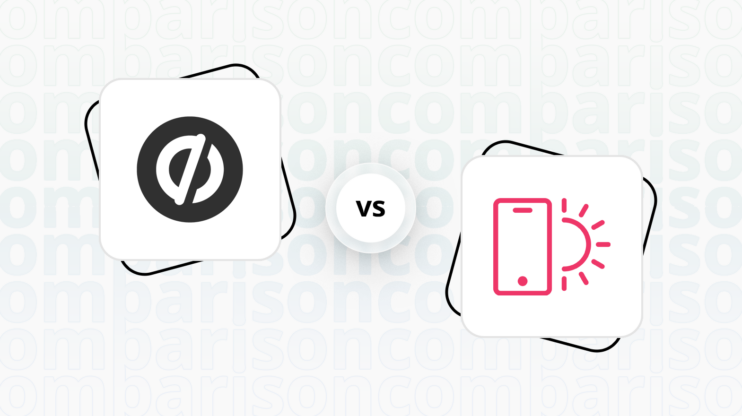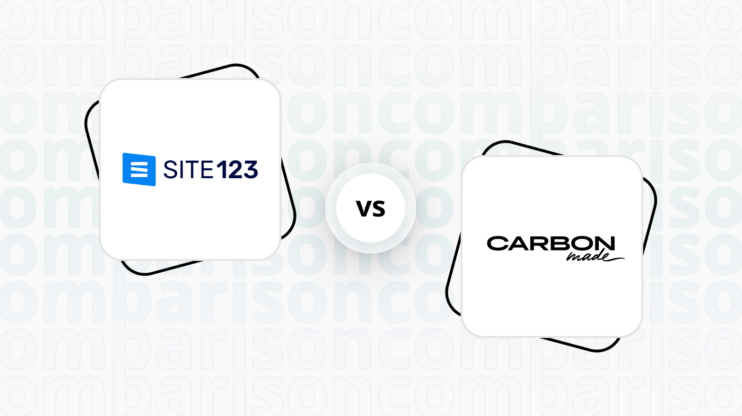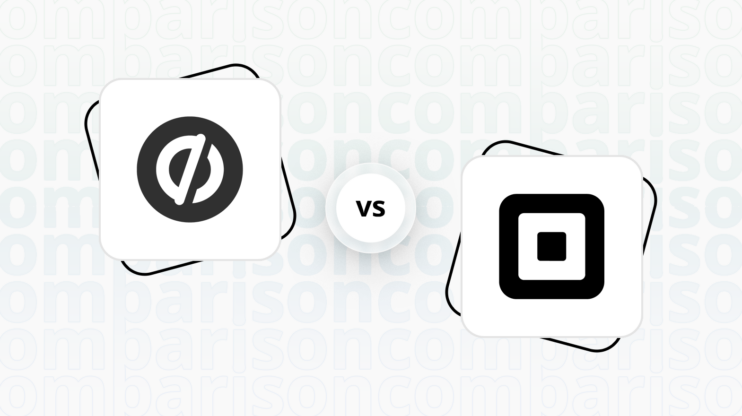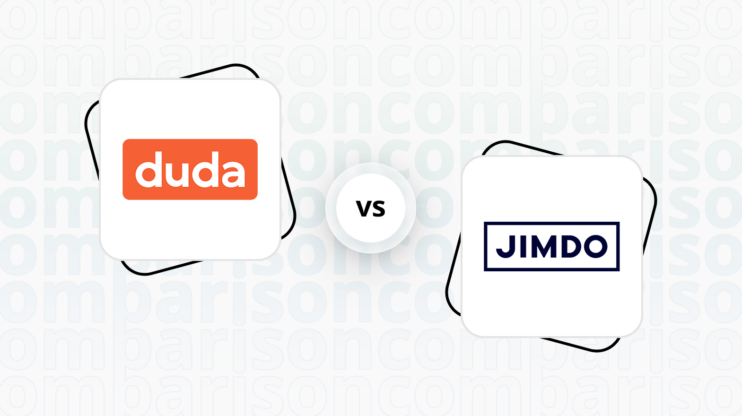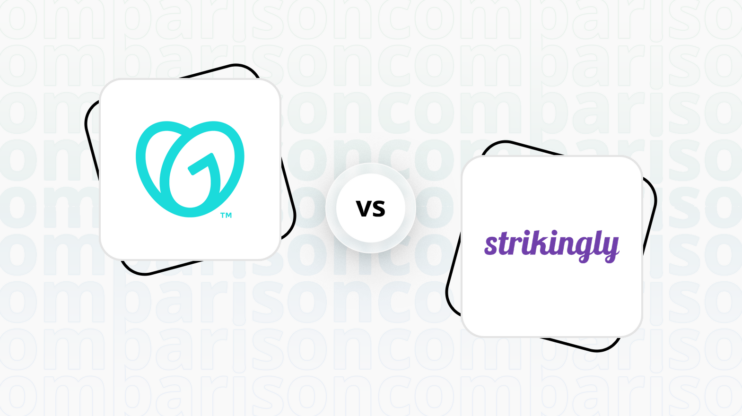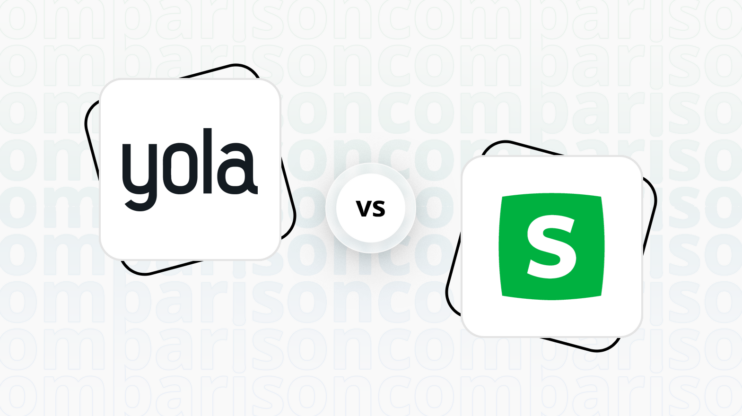Final verdict
BlueHost and Hocoos both offer unique features and capabilities, but they cater to different user needs and preferences.
-
BlueHost (Overall Grade: 6.8/10)
is a comprehensive web hosting service with a user-friendly website builder that integrates seamlessly with WordPress. It offers a wide range of customization options, making it suitable for users with varying levels of technical expertise. BlueHost excels in hosting quality, security, and customer support, making it a reliable choice for those looking for a robust and versatile platform. When comparing BlueHost vs Hocoos, BlueHost stands out for its extensive plugins and integrations, as well as its superior marketing features. -
Hocoos (Overall Grade: 5.6/10)
is an AI-driven website builder that simplifies the website creation process through advanced AI algorithms. It offers a range of customizable templates and features such as ecommerce integration, SEO optimization, and mobile responsiveness. Hocoos is ideal for users who prefer a more automated and intuitive approach to website building. In the BlueHost vs Hocoos comparison, Hocoos shines with its AI capabilities and ease of use, making it a great option for those who want to quickly set up a professional-looking website without technical expertise.

|

|
|
|---|---|---|
|
Design functionalities & templates |
7.2 |
7.2 |
|
Ease of use |
8.2 |
8.1 |
|
Ecommerce |
6.8 |
7.4 |
|
Website Editors |
7.3 |
7.7 |
|
Product testing options |
6.2 |
7.5 |
|
Price |
7.2 |
7.8 |
|
Hosting quality |
8.0 |
2.4 |
|
Website speed optimization |
6.5 |
6.2 |
|
Plugins/extensions and integrations |
9.1 |
6.3 |
|
Marketing features |
7.3 |
7.0 |
|
Customer support |
7.6 |
3.0 |
|
Website security |
8.3 |
4.5 |
|
AI capabilities |
1.5 |
7.3 |
|
User Management |
4.4 |
0.0 |
Best for ecommerce
 6.8
6.8
 7.4
7.4
Verdict
: Hocoos slightly outperforms BlueHost in ecommerce capabilities, making it a better choice for those seeking more advanced ecommerce features and customization options.
-
BlueHost
: BlueHost offers a solid foundation for ecommerce with features like product listings, secure payment gateways, and inventory management. It integrates well with WooCommerce, providing access to various payment gateways. However, it lacks POS capabilities and has limited customization options compared to more specialized ecommerce platforms. BlueHost is suitable for users who need a reliable hosting service with basic ecommerce functionalities. -
Hocoos
: Hocoos excels with its AI-driven website builder, offering a range of ecommerce features such as product management, order management, and marketing tools. It supports multiple payment gateways and provides robust customization options for product pages. Hocoos is ideal for users looking for a more advanced and customizable ecommerce solution.
Best for informational & business websites
 7.5
7.5
 7.4
7.4
Verdict
: BlueHost and Hocoos are both strong contenders for creating informational and business websites, but BlueHost has a slight edge due to its comprehensive hosting options and extensive plugin ecosystem.
-
BlueHost
: BlueHost is a versatile website builder and hosting platform that integrates seamlessly with WordPress. It offers a user-friendly drag-and-drop interface, making it accessible for users with little to no coding experience. With over 300 pre-installed templates and a variety of hosting plans, BlueHost caters to a broad audience, from personal blogs to large online businesses. Its comprehensive learning resources and robust security measures make it a reliable choice for informational and business websites. BlueHost scores 7.5 in this category. -
Hocoos
: Hocoos is an AI-driven website builder that simplifies the creation of professional-looking websites through customizable templates and drag-and-drop functionality. It offers features such as ecommerce integration, SEO optimization, and mobile responsiveness, making it easy to design and launch a website quickly. While Hocoos excels in ease of use and AI-driven customization, it lacks the extensive plugin ecosystem and detailed hosting information provided by BlueHost. Hocoos scores 7.4 in this category.
Detailed comparison
Design functionalities & templates
Design FunctionalitiesRepresents how well each platform allows for creative design and customization of websites.Score Components:
- Template Variety (30%): Range and quality of design templates.
- Customization (30%): Flexibility and options for design alterations.
- User Interface (20%): Ease and intuitiveness of the design process.
- Responsiveness (10%): Adaptability to different devices and screen sizes.
- Innovation (10%): Unique design features and tools.
 7.2
7.2
 7.2
7.2
Winner: Tie.
Both BlueHost and Hocoos offer robust design functionalities and templates, scoring equally in this category.
BlueHost’s WordPress website builder offers over 300 pre-installed templates and designs to cater to the diverse needs of its users, ensuring that there’s something for everyone, regardless of the niche or industry. These templates are designed to be responsive and SEO-friendly, enhancing the user experience and visibility of the websites.
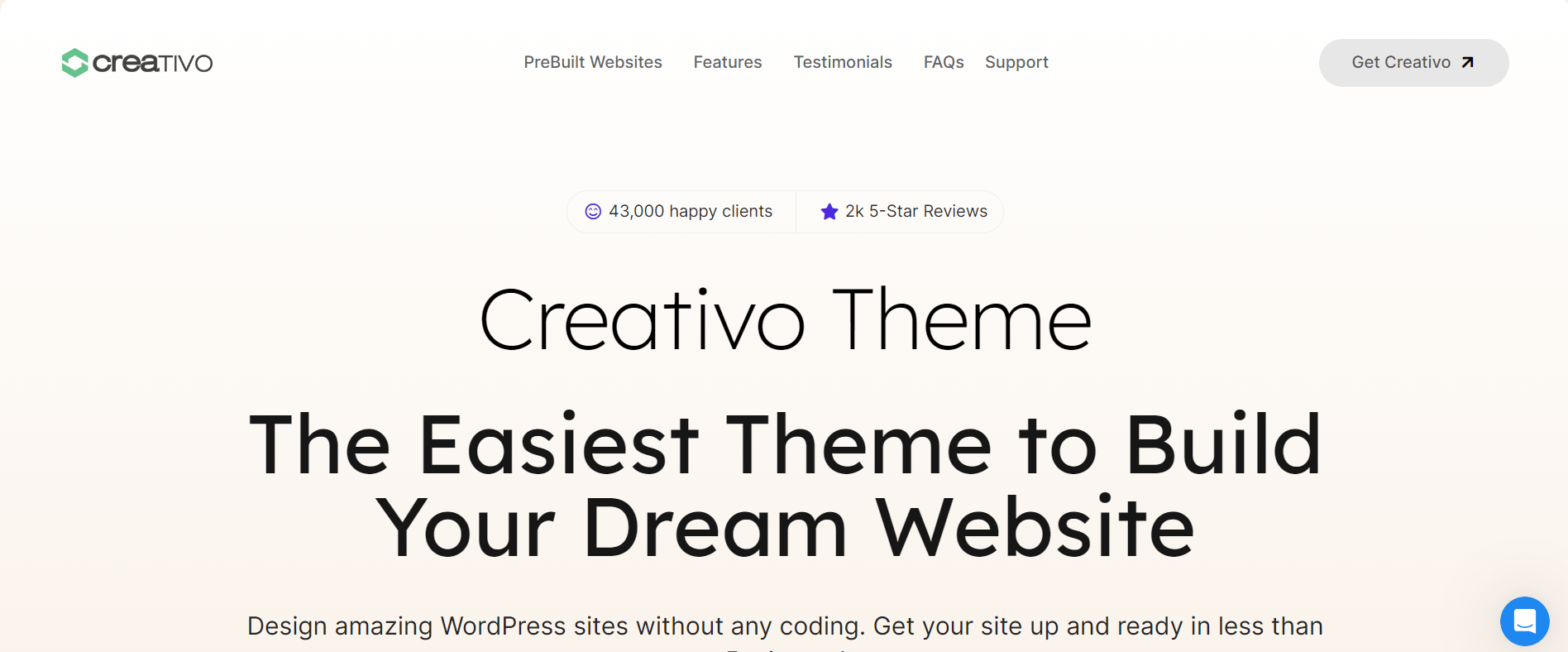
On the other hand, Hocoos offers a wide variety of designs for their website builder. With over 190 professionally designed templates to choose from, users can easily find a design that suits their needs and preferences. The templates are available for various industries and purposes, including business, ecommerce, portfolio, and more.
Get a head start on website creation with AI
Create a custom website tailored to your business needs 10X faster with 10Web AI Website Builder!
Ease of use
Ease of useReflects the platform’s overall user-friendliness.Score
Components:
- Learning curve (40%): Quickness and ease of getting started.
- Interface design (30%): Simplicity and intuitiveness of layout.
- User guidance (20%): Quality of tutorials and support.
- Flexibility (10%): Adaptability to various user skills.
 8.2
8.2
 8.1
8.1
🏆 Winner: BlueHost
. With a score of 8.2, BlueHost edges out Hocoos, which scored 8.1. BlueHost’s user-friendly interface and drag-and-drop functionality make it accessible for users of all skill levels, while Hocoos leverages AI-driven features for easy website creation. However, both platforms are designed with simplicity in mind and cater to users with no coding or design experience.
Learning Resources
🏆 Winner: BlueHost
. BlueHost’s WordPress Academy offers a wide range of comprehensive learning resources developed by WordPress experts, aimed at users of all levels. On the other hand, Hocoos lacks traditional learning resources, focusing more on simplicity and AI content generation.
For ecommerce
EcommerceMeasures the platform’s effectiveness in supporting online business activities.Score Components:
- Ecommerce themes and templates (20%): Variety and design of templates.
- Product management (25%): Ease of managing and organizing products.
- Payment options (25%): Variety and convenience of payment methods.
- Ecommerce features (20%): Features for managing an ecommerce store.
- Integration (10%): Compatibility with external e-commerce tools and services.
 6.8
6.8
 7.4
7.4
When it comes to ecommerce, both BlueHost and Hocoos offer a range of features to help users build and manage online stores. However, Hocoos, with a score of 7.4, slightly outperforms BlueHost, which has a score of 6.8.

|

|
|
|---|---|---|
|
Ecommerce themes and templates |
6.5 |
6.0 |
|
Product page customization |
7.0 |
7.0 |
|
Payment processing and commissions |
6.8 |
6.5 |
|
POS capabilities |
0.0 |
5.5 |
|
Payment gateways |
7.5 |
7.0 |
|
Product numbers |
6.0 |
6.5 |
|
Additional ecommerce features |
6.5 |
7.0 |
BlueHost ecommerce features:
- Product Listings
- Shopping Carts
- Secure Payment gateways
- Shipping Options and Tax Calculations
- Inventory Management
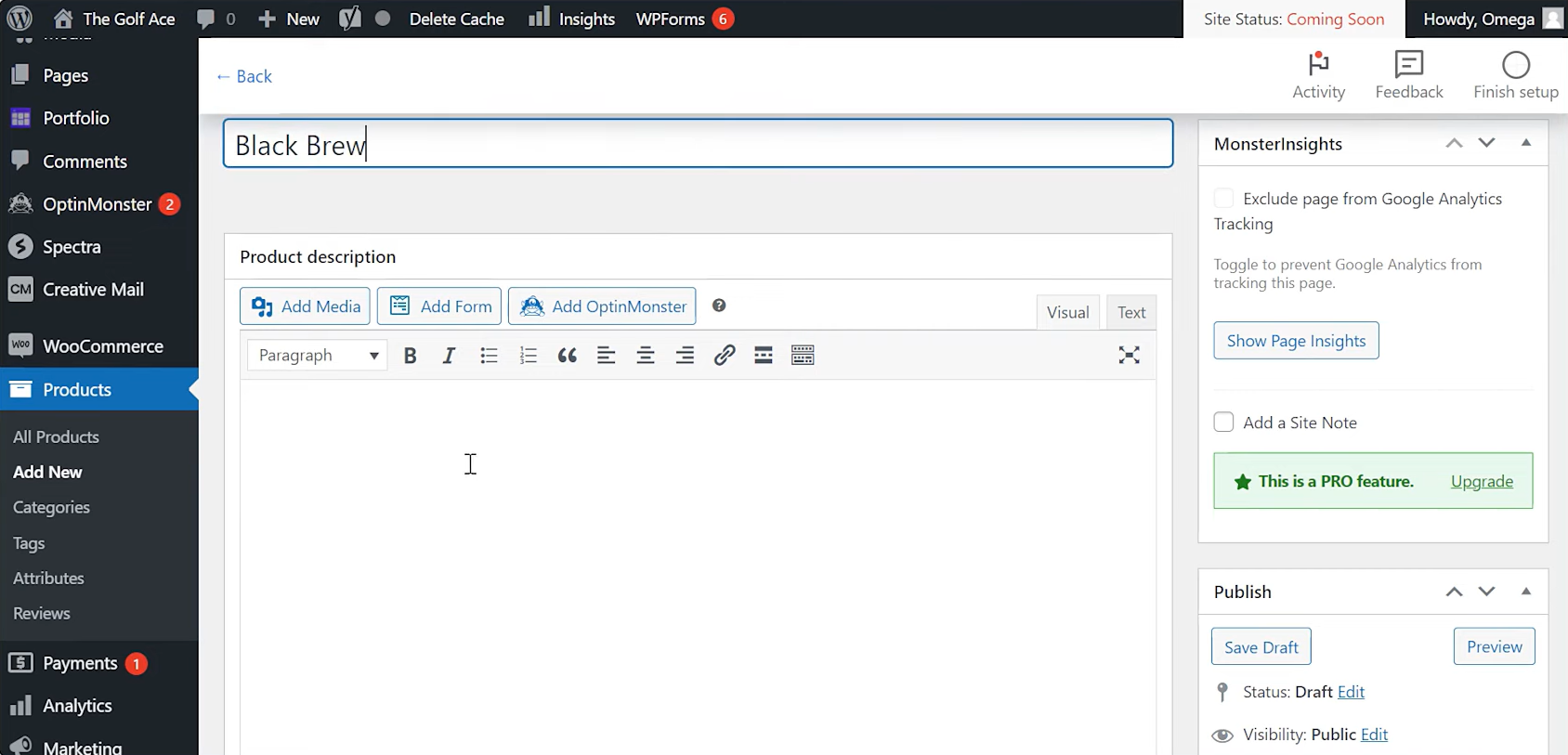
Hocoos ecommerce features:
- Product management
- Order management
- Payment processing
- Shipping and Logistics
- Marketing and SEO
- Analytics and reporting
- Customizability and Integrations
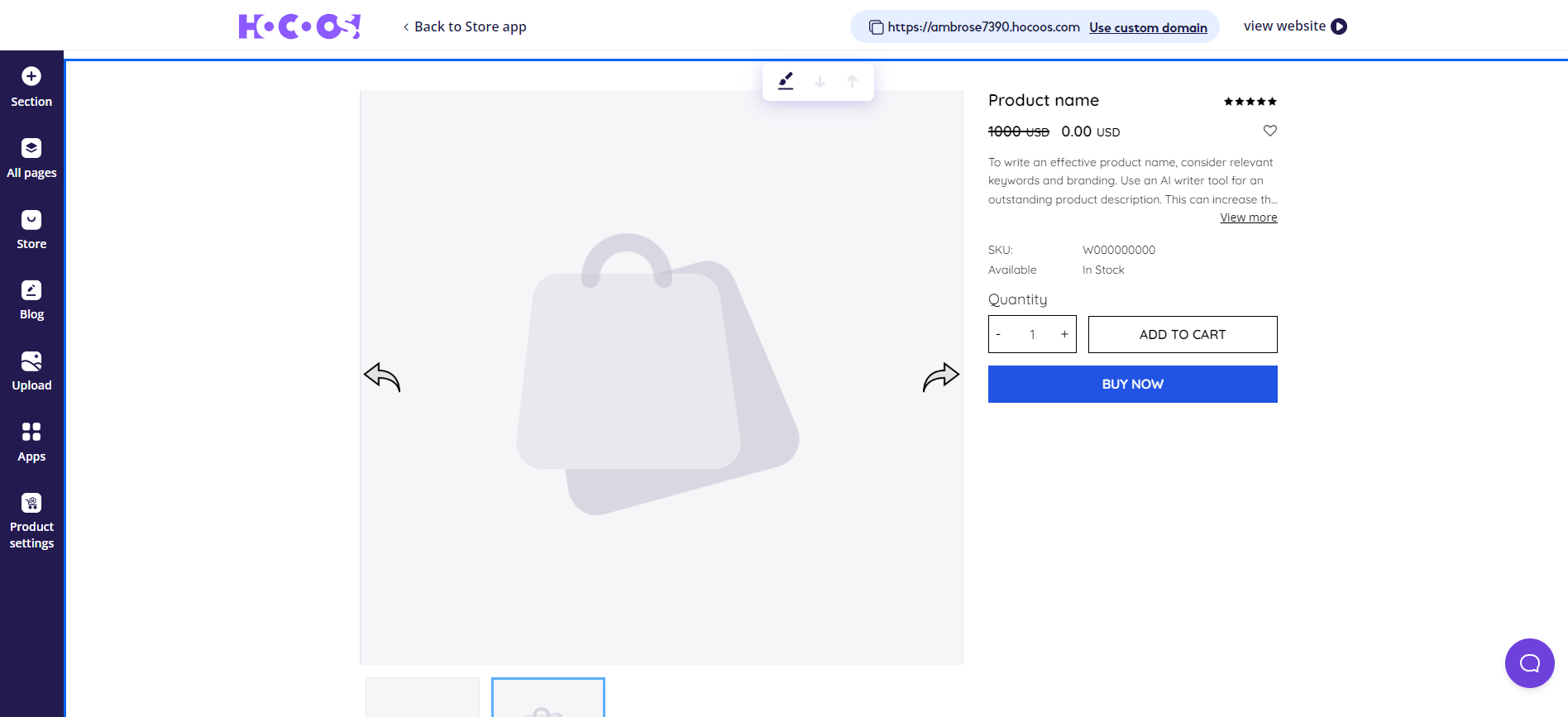
Ecommerce themes & templates
BlueHost’s website builder for eCommerce provides a selection of specific templates designed to streamline the creation of online stores. These templates are optimized for sales, featuring designs that accommodate product galleries, shopping carts, and checkout processes. However, the customization options might be limited compared to more specialized eCommerce platforms.
On the other hand, Hocoos does not rely on traditional templates for website creation, including ecommerce sites. Instead, it utilizes AI technology to generate unique and customized websites based on the user’s specific inputs.
Product page customization
BlueHost’s website builder offers robust customization features for product pages, allowing users to tailor product details like titles, descriptions, images, and pricing according to their preferences. It supports the creation of product variants and options, facilitating the sale of items with multiple choices such as size, color, and material directly from the product page.
Hocoos enables the creation and editing of professional-looking product pages, tailored to enhance the appeal of your products to your target audience, ultimately aiming to boost sales. Additionally, Hocoos allows for easy setup of product variations, including different sizes, colors, or attributes, empowering you to customize offerings, manage pricing, and ensure availability for each variation.
Payment processing
BlueHost doesn’t directly support numerous payment gateways. However, it does integrate with WooCommerce, a platform that facilitates integration with various payment gateways like PayPal and Stripe. While BlueHost doesn’t impose transaction fees, the payment gateways might. Furthermore, it lacks Point of Sale (POS) capabilities.
Hocoos simplifies website creation through AI-driven features, offering customizable websites tailored to user preferences. Its platform allows quick website setup by answering a few questions, catering to various business needs such as blogs, online stores, and bookings. Users can personalize their websites using a user-friendly editor for layout, colors, and content. Additionally, Hocoos integrates payment methods like PayPal and Stripe for seamless management of transactions and inventory.
Website Editors
Website EditorsEvaluates the platforms’ website building and editing capabilities.Score Components:
- Customization tools (40%): Range and power of editing features.
- Editor usability (30%): User experience within the editor.
- Design flexibility (20%): Freedom in layout and design changes.
- Update and maintenance ease (10%): Simplicity of updating and maintaining the site.
 7.3
7.3
 7.7
7.7
🏆
Winner: Hocoos
. Hocoos, with a score of 7.7, is an AI-driven website builder that simplifies the creation of personalized websites through a unique process that requires users to answer eight simple questions. This platform utilizes advanced AI algorithms to automatically generate a custom website tailored to the user’s business needs, including design, content, and images. It features an easy-to-use editor for further customization and offers AI-powered tools for content creation, logo design, and more, making it accessible to users of all technical skill levels.
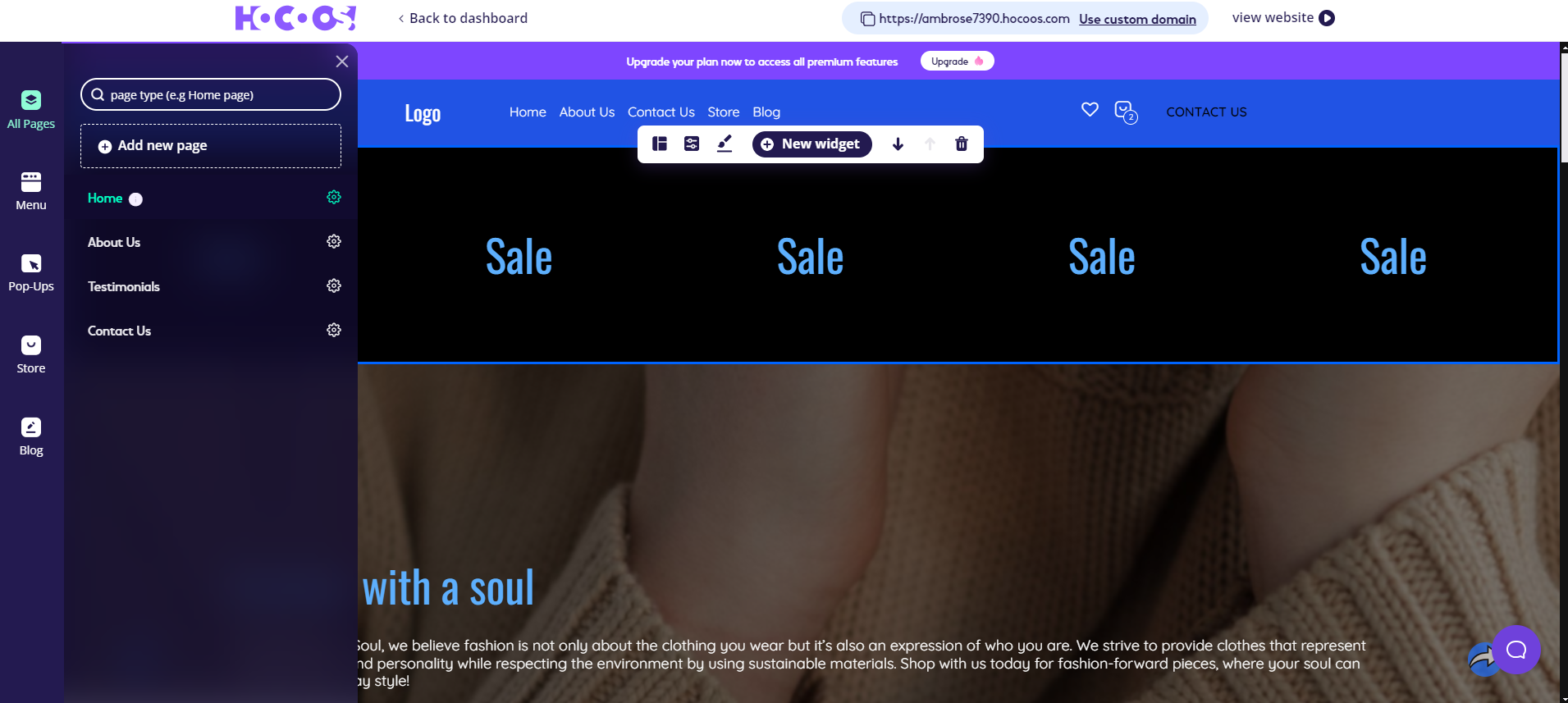
BlueHost’s website builder editor, scoring 7.3, is designed for ease of use, catering to both beginners and advanced users. It offers a section based drag-and-drop interface, allowing users to easily add, remove, and customize elements on their website without needing to code. Users can choose from a wide range of templates and customize them to fit their brand, including adjusting layouts, colors, and fonts. Additionally, the editor provides access to stock photos, SEO tools, and responsive design features, ensuring websites look great on all devices and can rank well on search engines.
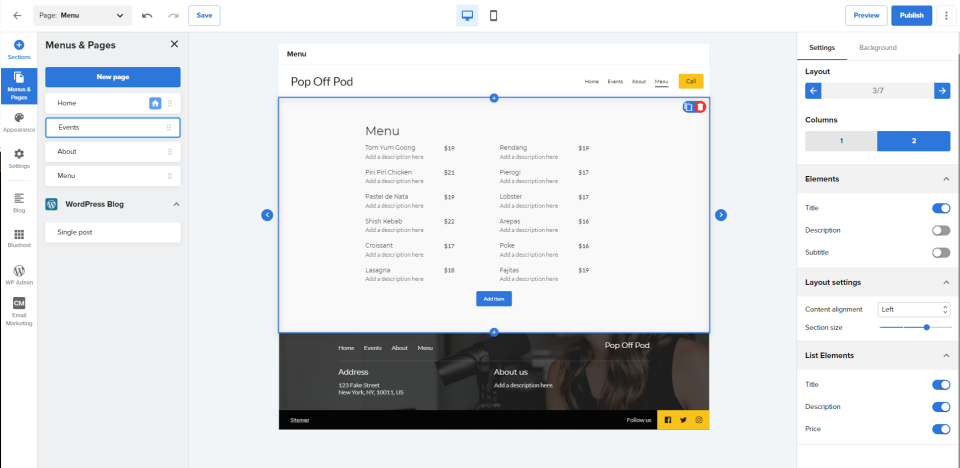
Mobile editor/app
 5.0
5.0
 0
0
🏆
Winner: BlueHost
. Neither BlueHost nor Hocoos offer a dedicated mobile app for website editing. However, BlueHost does provide the ability to edit your website on a mobile browser, albeit with some limitations. This feature can be beneficial for users who need to make quick changes on the go. On the other hand, Hocoos does not provide any information about mobile editing capabilities. Therefore, BlueHost takes the lead in this category due to its limited mobile browser editing capabilities.
Product testing options
Product Testing OptionsAssesses the options for trying out platform features before commitment.Score Components:
- Trial quality (40%): Extent and usefulness of the trial or free version.
- Feature accessibility (30%): How many features are available to test.
- Trial duration (20%): Length of the trial period.
- Ease of transition (10%): Smoothness of moving from trial to paid plans.
 6.2
6.2
 7.5
7.5
Overall Result
:
Hocoos wins
. Hocoos scores 7.5, higher than BlueHost’s 6.2. Hocoos offers a free version and allows testing of some premium features within this free plan. BlueHost, on the other hand, does not offer a free or trial version, but allows testing of premium features within a 30-day refundable period.

|

|
|
|---|---|---|
|
Free Plan |
No |
Yes |
|
Trial Duration |
No | No |
|
Testing Premium Features |
Within 30-day refundable period |
Some features with free plan |
|
Money Back Guarantee |
30-day money back guarantee | 14-day money back guarantee |
Price
PriceLooks at the cost-effectiveness and value for money of each platform.Score Components:
- Plan value (40%): What each pricing tier offers.
- Transparency and clarity (30%): Clearness of pricing structures.
- Flexibility of plans (20%): Range of options to suit different budgets.
- Hidden costs (10%): Additional expenses not included in the plan.
 7.2
7.2
 7.8
7.8
BlueHost and Hocoos have similar price scores, but BlueHost offers more comprehensive plans and a significant discount for annual subscriptions.

|

|
|
|---|---|---|
|
Free |
No offering at this amount. |
Free ($0/month): Limited features, ideal for personal projects or trying out the platform. Includes free website hosting, a limited booking system, a blog (without AI blogging), 15 image uploads, and 20 uses of AI content generation. |
|
$10-$20 |
Basic ($15.99/month): Made for a simple website or blog, 1 website with 10GB SSD storage, Free CDN, Free Domain 1st year, Managed WordPress Hosting, Free SSL 1st year and Chat Support. Value for price: 6.5 |
Premium ($15/month): All features, including a free custom domain name, online payments, 600,000+ stock images, marketing integrations, unlimited image uploads, unlimited AI features, a custom email address, and email marketing. Value for price: 9.0 |
|
$20-$30 |
Choice Plus ($27.99/month): Ideal for multiple sites needing storage, security, backups, 3 websites with 40GB SSD storage, Free CDN, Free Domain 1st year, Managed WordPress hosting, Free SSL, Free Domain privacy 1st year, Malware scanning, daily site backups are free for the 1st year with the purchase of a 12 or 36-month package. Otherwise, users are required to pay a one-time fee of $35.88 for backup services. Value for price: 7.5 |
No offering at this amount. |
|
$30-$35 |
Online Store ($32.99/month): Great for all online selling, built-in eCommerce tools, 3 websites with 40GB SSD storage, Free CDN, Free Domain 1st year, Managed WordPress hosting, Free Domain privacy 1st year, Malware Scanning, Exclusive Theme Store, Store Analytics, Unlimited products, Secure Payment options, Bookings & appointments, Shipping labels, product search and filtering, daily site backups are free for the 1st year with the purchase of a 12 or 36-month package. Otherwise, users are required to pay a one-time fee of $35.88 for backup services. Value for price: 8.5 |
No offering at this amount. |
|
$35+ |
Pro ($39.95/month): Perfect for high traffic, advanced storage, security, 5 websites with 100GB SSD storage, Free CDN, Free Domain 1st year, Managed WordPress hosting, Free SSL, Free Domain privacy 1st year, Malware Scanning, daily site backups are free for the 1st year with the purchase of a 12 or 36-month package. Otherwise, users are required to pay a one-time fee of $35.88 for backup services. Value for price: 9.0 |
No offering at this amount. |
location. As a result in rare cases the prices displayed here can differ from the ones you see on their
websites.
Hosting quality
Hosting
qualityExamines the reliability and performance of the hosting solutions.Score Components:
- Uptime (40%): Consistency and reliability of website availability.
- Speed (30%): Loading times and performance.
- Bandwidth and storage (20%): Sufficiency of resources provided.
- Data centers (10%): Quality and distribution of hosting infrastructure.
 8.0
8.0
 2.4
2.4
Winner: BlueHost
BlueHost offers a comprehensive range of hosting options, including managed WordPress hosting, with a 99.9% uptime guarantee and six global data centers. It’s designed to support websites at various stages of growth, ensuring fast load times with technologies like SSD storage, CDN services, and Cloudflare integration. On the other hand, Hocoos provides hosting but lacks explicit details on the type of hosting, uptime statistics, and data center locations, which results in a lower rating.

|

|
|
|---|---|---|
|
Do they offer hosting? |
Yes, offers a range of hosting options |
Yes, but lacks explicit details on bandwidth limitations and automatic data backups |
|
Data Centers: |
6 data centers: Orem and Provo, Shanghai, Mumbai and Hong Kong, London |
Hocoos does not provide any information about its data centers |
|
Type of hosting: |
Managed WordPress Hosting |
Hocoos does not specify the type of hosting |
|
Uptime: |
99.9% |
Hocoos does not provide uptime statistics |
|
Uptime Guarantee: |
Yes, 99.9% |
No |
Website Speed Optimization
Website Speed OptimizationEvaluates optimization of website loading timesScore Components:
- PageSpeed Score (30%): Google’s score indicating performance optimization.
- Loading Time (30%): The average time until a website is fully interactive.
- Mobile Optimization (15%): Optimization effectiveness for mobile devices.
- Resource Optimization (15%): Optimizing images, scripts, and other heavy resources.
- CDN Usage (10%): Use of CDN to enhance speed across geolocations.
 6.5
6.5
 6.2
6.2
🏆 Winner: BlueHost
Both BlueHost and Hocoos prioritize website performance and page speed, but BlueHost has a slight edge due to its emphasis on Core Web Vital improvements.

|

|
|
|---|---|---|
|
Focus |
CDN, Server Optimization |
CDN, Minimization of HTTP Requests, Caching |
|
Performance Tools |
Google Lighthouse, PageSpeed Insights |
Google PageSpeed Insights Integration |
|
Key Strategies |
CDN, Server Optimization |
CDN, Minimization of HTTP Requests, Caching |
|
Load Times |
Varies widely, depending on optimization and website complexity |
Varies widely, depending on optimization and user’s location |
|
Page Speed Scores Range |
Varies widely, depending on optimization and website complexity |
Varies widely, depending on optimization and user’s location |
|
Core Web Vitals Improvement |
Emphasis on LCP, FID, CLS improvements |
No information available |
BlueHost, a comprehensive web hosting service, places a strong emphasis on website performance and page speed. It uses strategies such as CDN and server optimization to enhance site speed. BlueHost also focuses on improving Core Web Vitals, including Largest Contentful Paint (LCP), First Input Delay (FID), and Cumulative Layout Shift (CLS). However, both load times and PageSpeed scores can vary widely, depending on the level of optimization and the complexity of the website.
On the other hand, Hocoos, an AI website builder, also prioritizes website performance and page speed. It uses strategies such as CDN, minimization of HTTP requests, and caching to enhance site speed. However, there’s no available information about Hocoos’ efforts to improve Core Web Vitals. Similar to BlueHost, both load times and PageSpeed scores can vary widely, depending on the level of optimization and the user’s location.
Get a head start on website creation with AI
Create a custom website tailored to your business needs 10X faster with 10Web AI Website Builder!
Plugins and integrations
Plugins and integrationsMeasures the range and effectiveness of additional plugins and integrations.Score Components:
- Variety of options (40%): Range of available add-ons.
- Integration smoothness (30%): Ease of integrating plugins into the site.
- Quality of plugins (20%): Functionality and reliability of the options.
- Custom integration capabilities (10%): Support for custom or third-party integrations.
 9.1
9.1
 6.3
6.3
🏆 Winner: BlueHost.
With a score of 9.1, BlueHost leads the way in plugins and integrations. Its seamless integration with WordPress allows users to access thousands of plugins and extensions, significantly expanding the functionality of the website builder. Hocoos, scoring 6.3, also offers a wide range of plugins and extensions, but falls short in comparison to the vast ecosystem provided by BlueHost.
Marketing Features
Design FunctionalitiesRepresents how well each platform allows for creative design and customization of websites.Score Components:
- Template Variety (30%): Range and quality of design templates.
- Customization (30%): Flexibility and options for design alterations.
- User Interface (20%): Ease and intuitiveness of the design process.
- Responsiveness (10%): Adaptability to different devices and screen sizes.
- Innovation (10%): Unique design features and tools.
 7.3
7.3
 7.0
7.0
🏆
Overall Winner: BlueHost
. BlueHost edges out Hocoos with a slightly higher score, offering a comprehensive suite of marketing tools, including SEO, email marketing, blogging, social media integration, analytics and reporting, and ads and promotions. Hocoos also offers a robust set of marketing features, but falls slightly short in comparison.

|

|
|
|---|---|---|
|
SEO Tools |
|
|
|
Email Marketing |
|
|
|
Blogging |
|
|
|
Social Media Integration |
|
|
|
Analytics and Reporting |
|
|
|
Ads and Promotions |
|
|
Customer Support
Customer supportEvaluates the quality and availability of support options.Score Components:
- Response time (40%): Speed of support responses.
- Support quality (30%): Effectiveness and helpfulness of the support.
- Availability (20%): Range of support channels (phone, chat, email).
- Resource richness (10%): Quality of self-help and educational materials.
 7.6
7.6
 3.0
3.0
🏆 Winner: BlueHost
. In the BlueHost vs Hocoos comparison, BlueHost stands out with its comprehensive 24/7 customer support, including chat and phone support for general inquiries, and technical assistance available from 7 a.m. to midnight EST. This ensures that users can get help whenever they need it, making BlueHost a reliable choice for those who prioritize robust customer support.
Hocoos, on the other hand, does not provide detailed information about their customer support hours and availability. While they emphasize that their support is 100% human, the lack of specifics and lower customer support score suggest that users might not receive the same level of assistance as they would with BlueHost.
Security
SecurityLooks at the platforms’ security measures and data protection.Score Components:
- Data protection (40%): Safeguards for user and customer data.
- SSL and encryption (30%): Implementation of secure connections.
- Compliance (20%): Adherence to industry security standards.
- Regular updates (10%): Frequency of security updates and patches.
 8.3
8.3
 4.5
4.5
🏆
Winner: BlueHost
. BlueHost’s security measures are more comprehensive and transparent. They prioritize data protection through SSL certificates, regular backups, and additional security features like SiteLock for malware scanning. Compliance with data protection regulations and a commitment to privacy are central to their service, ensuring users’ data is handled securely. They also enhance website security through several key measures, including offering free SSL certificates to ensure encrypted connections for all websites hosted on their platform. They provide automated backups to safeguard website data, allowing for easy restoration in case of loss or compromise. The hosting service incorporates secure configuration options and plugins, especially for WordPress hosting, to bolster website defenses. Additionally, BlueHost implements 24/7 monitoring to promptly detect and respond to security threats, along with malware scanning and removal processes to protect websites from malicious software, ensuring a secure and reliable hosting environment for users.
On the other hand, Hocoos does not provide any specific information regarding the security measures they utilize for website security. However, they do emphasize security for websites built with its platform, integrating advanced encryption protocols and providing regular security updates to guard against potential threats. This ensures that websites created using Hocoos benefit from robust security features, aiming to protect both the website owners and their visitors. Despite this, the lack of transparency and specific information about their security measures puts them at a disadvantage compared to BlueHost.
AI Capabilities
AI capabilitiesMeasures the effectiveness of AI-driven features and tools.Score Components:
- Automation efficiency (40%): Impact of AI on streamlining processes.
- Personalization (30%): AI-driven customization for users or customers.
- AI-Assisted design (20%): Role of AI in website design and functionality.
- Data analysis (10%): Use of AI in interpreting user data and analytics.
 1.5
1.5
 7.3
7.3

|

|
|
|---|---|---|
|
AI Website Builder |
|
Hocoos offers an AI website builder that creates websites based on user inputs |
|
AI Ecommerce Features |
|
Hocoos uses AI for personalized product recommendations, visual search, and customer service |
|
AI Content Generation |
|
Hocoos has an AI Content Creator for generating written material |
|
Additional AI Features |
|
Hocoos provides AI-powered widgets, mobile optimization, and improved customization options |
🏆 Winner: Hocoos
. With a score of 7.3, Hocoos clearly outperforms BlueHost in terms of AI capabilities. Hocoos offers a range of AI features including an AI website builder, AI ecommerce features, AI content generation, and additional AI features. On the other hand, BlueHost, with a score of 1.5, does not have any AI capabilities.
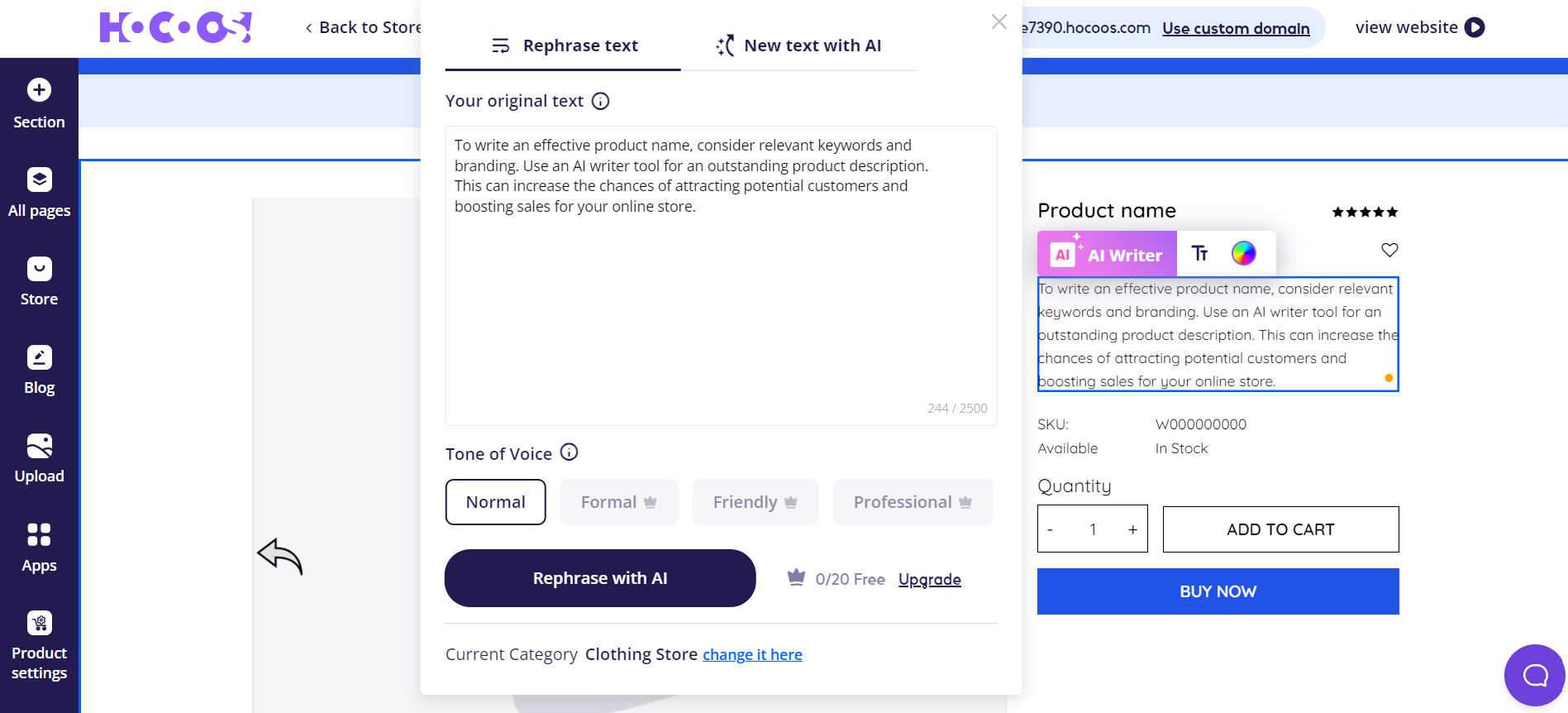
User Management
User ManagementAssesses the platforms’ capabilities in managing user roles, permissions, and accessibility.Score Components:
- Role Customization (40%): Flexibility in creating and defining user roles and
permissions. - Ease of Management (30%): User interface and tools for managing users.
- Access Control (20%): Effectiveness of access control measures for different user
levels. - Scalability (10%): Ability to manage a growing number of users efficiently.
 4.4
4.4
 0.0
0.0
🏆 Winner: BlueHost
. When it comes to managing your online team, BlueHost and Hocoos offer different levels of user management.
- BlueHost does support multi-user management, however, there’s no mention about the number of users or their roles and permissions.
- Hocoos, on the other hand, does not allow to have multiple users for editing your website.
Given the lack of multi-user support in Hocoos, BlueHost is the clear winner in this category.
Additional Features

|

|
|
|---|---|---|
|
SSL Certificate |
|
|
|
Custom Domain |
|
|
|
Free Custom Domain Included |
|
|
|
International Domains |
|
|
|
Mobile Responsive |
|
|
|
Page Speed |
|
|
|
Website Builder Mobile App |
|
|
|
Convert a Website To An App |
|
|
|
Website Analytics |
|
|
|
Multilingual Sites |
|
|
|
Multiple Users |
|
|
User Feedback
Users appreciate BlueHost for its comprehensive free offerings, including SSL, subdomains, and custom email, along with additional services like free domain registration and CDN. The platform’s intuitive interface and user-friendly website builder cater to both beginners and experienced developers. However, concerns arise regarding the significant price increase upon renewal, limited free website templates, and unresolved technical issues with poor customer support, hindering users’ ability to effectively manage their websites and businesses. Addressing these concerns could enhance overall user satisfaction with BlueHost.
Hocoos does not have any reviews on G2, making it challenging to gauge user feedback accurately. However, its focus on providing a user-friendly website builder with customizable templates and drag-and-drop functionality suggests it aims to cater to individuals and businesses looking for an easy-to-use platform. The lack of user reviews means potential users might need to rely on other sources or personal trials to assess its effectiveness compared to BlueHost vs Hocoos.
The making of this blog
We followed a clear, step-by-step process to write and research this article.
FAQ
Which platform is better for ecommerce, BlueHost or Hocoos?
Can I use BlueHost or Hocoos for a blog or informational website?
How do BlueHost and Hocoos compare in terms of design and templates?
Which platform offers better customer support, BlueHost or Hocoos?
Are there any AI capabilities available on BlueHost or Hocoos?
Which platform is more user-friendly for beginners?
How do the hosting quality and website speed optimization compare between BlueHost and Hocoos?
Can I manage multiple users on BlueHost or Hocoos?
What are the pricing options for BlueHost and Hocoos?
Which platform is recommended based on overall performance and features?










